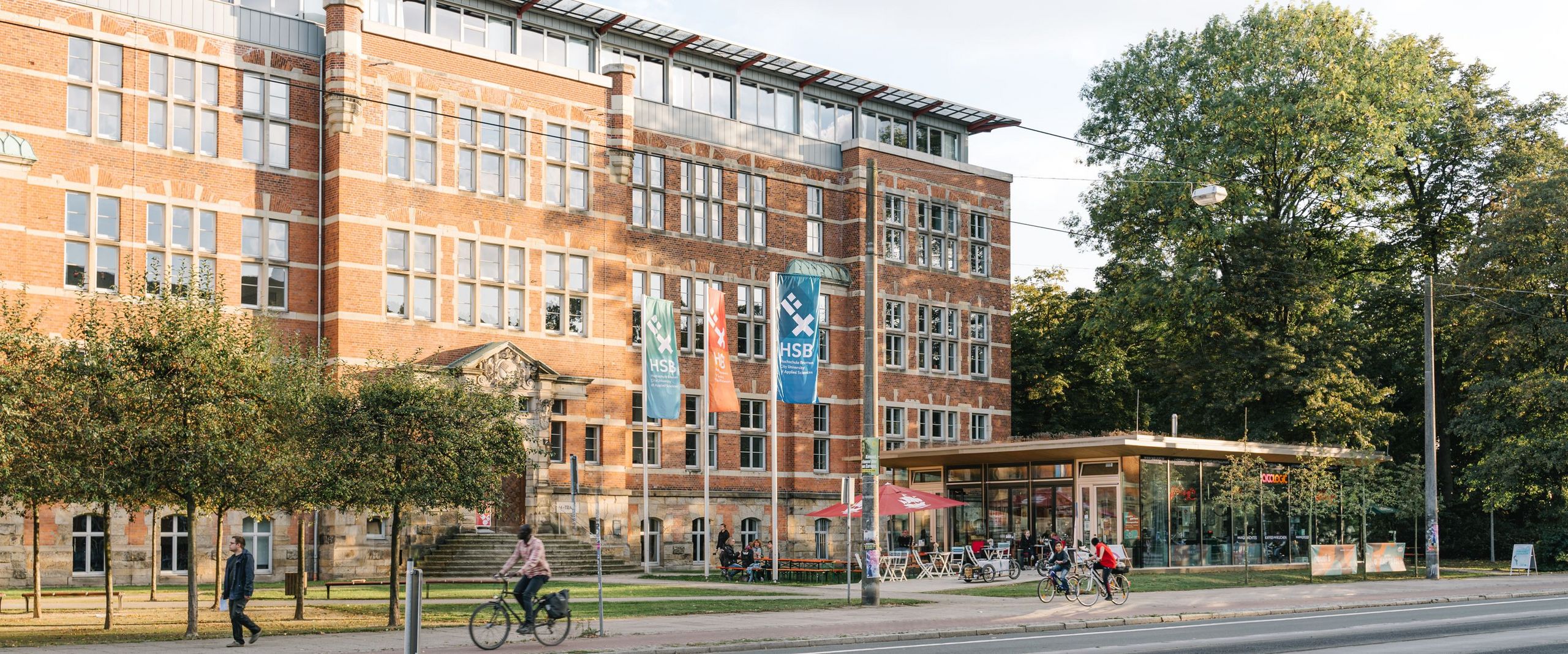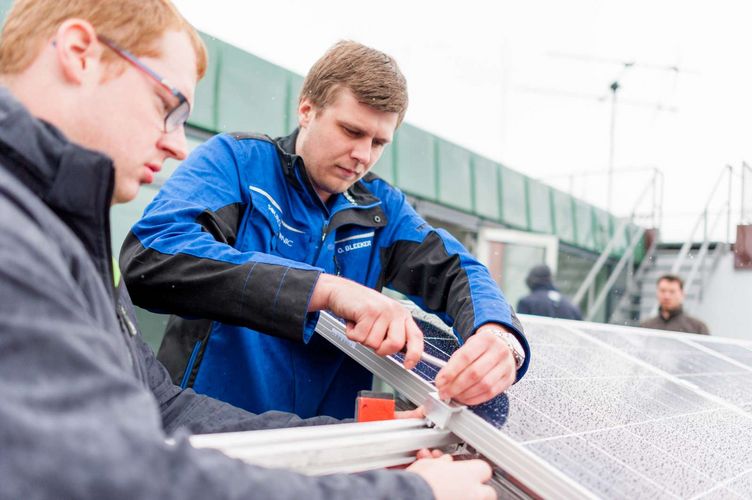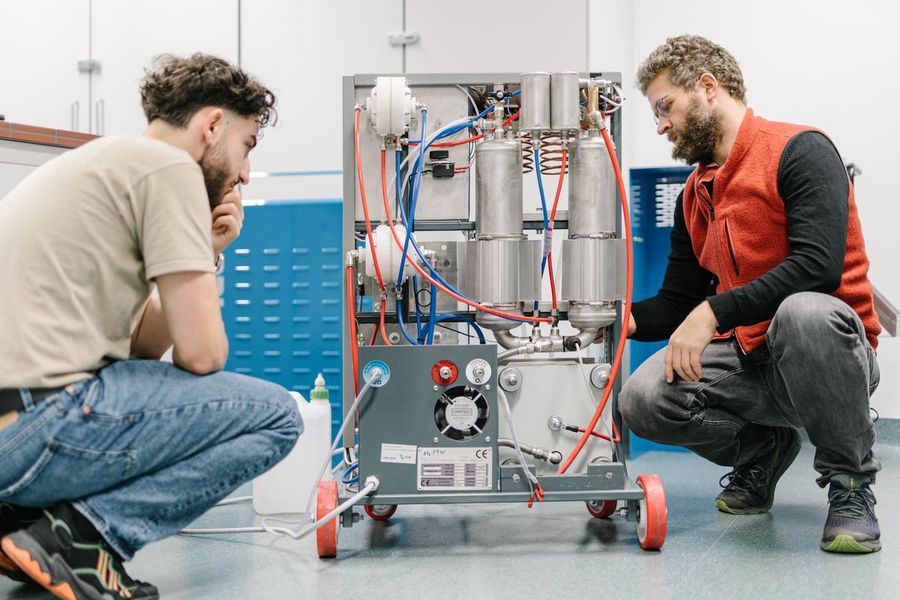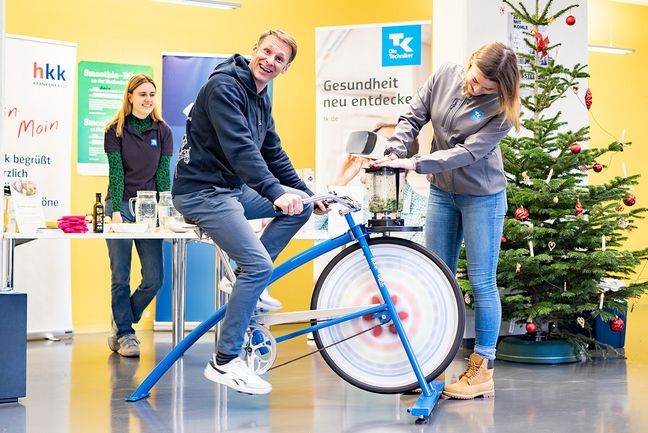
Our profile
Both teaching and research at Hochschule Bremen (HSB) are conducted in awareness of our responsibility to society as a whole and with regard to ecological and economic issues. We are committed to achieving an equitable balance between these three major concerns. Sustainable development and a corresponding focus in teaching receive top priority and are clearly anchored principles in our mission statement. Sustainability also plays an important role in the management of HSB’s premises and buildings at its four campus locations: the focus here is always on the economical and efficient use of resources.
Our more than 600 employees and almost 9,000 students share a keen awareness of the of sustainability and climate protection. This is reflected in the numerous degree programmes, (research) projects and events that staff and students from the five faculties have been responsible for over the years – often in cooperation with partners in the city and surrounding region. There has also been considerable recognition for their efforts – for example, awarded several times with the Bremen Climate Protection Prize. With such proactive commitment, HSB makes a decisive contribution to raising awareness of the topic of sustainability and providing important impetus for a sustainable future.
This web page provides exemplary insights into HSB's activities in the area of sustainability.
In order to structurally anchor HSB's commitment to sustainability, in the summer semester of 2023 the Academic Senate initiated the establishment of a Sustainability Commission. The aim of the commission is to develop a sustainability strategy for the university. It is to recommend guidelines and structures to implement sustainability in the areas of teaching, continuing education, research, administration, buildings, infrastructure and outdoor spaces as well as with regard to mobility. The commission comprises two professors, two academic staff members and two students, including their deputies. The chairperson is since July 2024 Prof. Dr. Christiane Trüe. Her deputies are the student Sarah Thissen and Dr. Shazia Wülbers.
The meeting dates of the Commission for Sustainability are announced via the mailing list nachhaltigkeitskommission@lists.hs-bremen.de.
Around 30% of all degree programmes at HSB already deal with the central issues of climate change, energy, the environment and sustainability – for example the Master's degree programmes ‘Sustainable Energy and Environment Systems’, ‘Interdisciplinary Sustainability Management’ and ‘Sustainable Business & Entrepreneurship’. All degree programmes at HSB have an important practical component and are characterised by diverse cooperation with partners in the city of Bremen and the surrounding region. Accordingly, the activities incorporated in the degree programmes have a direct local impact.
The commitment of HSB students to greater sustainability also extends beyond their studies – whether through activities in the General Students’ Council (AstA), in the student faculty committees, in various political groups such as Students for Future Bremen and Architects for Future or in projects such as ‘Too good to go’, which campaigns for less food waste.
HSB members regularly meet to share and discuss their findings and results in the field of sustainability and climate protection with other experts and interested parties at transfer events such as lecture series, talks, discussion forums and exhibitions. For example, the lecture series ‘Facets of sustainability – What is Bremen doing for climate protection?’, which has been running for several years. Also in this context, the joint lecture series ‘Economy and welfare state in climate change’ held by the Chamber of Employees and Hochschule Bremen in winter semester 2022/23.
The expertise of HSB academics is also much in demand in areas such as urban development and local politics. Examples include projects dealing with climate-friendly transport, architecture and spatial planning or activities as part of the Enquete Commission ‘Climate Protection Strategy for the State of Bremen’.
Research a HSB focusses on the topic of sustainability in a variety of ways. For example, topics such as digitalisation and its consequences for society occupy an important position. Other research projects focus on how to deal with the challenges facing society – be it in the areas of health and care, social work, tourism and leisure or in the political shaping and management of sustainability.
HSB functions as centre of excellence for ‘Region in Transition’ – one of its six research clusters. In these clusters, researchers work together on an interdisciplinary basis and network with cooperation partners to find solutions to societal challenges. The topics are diverse: they focus on aerospace and the sustainable use of the oceans – including as a mode of transport and questions of sustainable shipping. Other scientists are researching solutions in the fields of renewable energies, environmental technologies, and their sustainable use, as well as architecture, construction, the environment, and urban development. In the research cluster ‘Dynamics, Tension and Xtreme Events’, researchers investigate the effects of innovations and transformations on the economy and society. The ‘Quality of Life’ cluster also conducts research into sustainability: for example, in the context of various activities on climate policy and a project on ecological and social standards in international supply chains.
Region in Transition (information currently only available in German)
Dynamics, Tension and Xtreme Events (information currently only available in German)
The HSB has formats such as real-world laboratories in which scientists and students work directly with business, politics, public administration, and civil society on future issues relating to climate protection and sustainability. There are many examples – both current and in previous years. Here, we present three such projects:
Fancy a fresh smoothie? Markus Schnare from HSB pedals the smoothie bike to activate the blender. Luise Eben (right) and Nadine Zarges from Move UP provide the smoothie bike with all the utensils on behalf of the cooperating health insurance companies.
© HSB-Thomas Ferstl
Fancy a fresh smoothie? Markus Schnare from HSB pedals the smoothie bike to activate the blender. Luise Eben (right) and Nadine Zarges from Move UP provide the smoothie bike with all the utensils on behalf of the cooperating health insurance companies.
HSB offers its employees and students a University Health Management (HGM) programme. This is gradually being expanded. To this end, it is cooperating with hkk Krankenkasse and Techniker Krankenkasse (TK). Together with these partners, the HGM programme is developing support programmes for all members of Hochschule Bremen. Examples include regular exercise programmes and ‘mindful breaks’ to promote healthy working in everyday university life.
In 2003, HSB was the first public institution in Bremen to be recognised for its environmental management system in accordance with the Eco Management and Audit Scheme (EMAS) regulation. Since then, it has successfully passed the external audit sixteen times. Previous successes, targets and other projects are documented in an environmental statement. The EMAS regulation describes the requirements for an operational environmental management system (EMS), whereby the various components are anchored in the organisation, such as an environmental policy, objectives, and specific measures to improve environmental performance.
Universities are like small cities and energy-intensive businesses. The questions and solution strategies for a climate-friendly remodelling of HSB's premises and buildings are therefore also transferable to other institutions in Bremen. For a climate-friendly and sustainable development of the existing university premises, buildings and scientific-technical infrastructure, an overarching action strategy is therefore required in addition to climate protection concepts – a ‘climate-neutral’ master plan that is based on appropriate criteria, standards, and procedures for qualified implementation. How can university life be made more climate-friendly and sustainable in the use of indoor and outdoor spaces at HSB? How should studying, research, teaching and learning be organised? How can HSB position itself in the city in order to be resource-efficient and climate-neutral? With the support of the State of Bremen, university management, academics and administrative staff are currently developing corresponding ideas and concepts for the Neustadtswall site as a model project.
Further information on HSB campus developments (German only)



